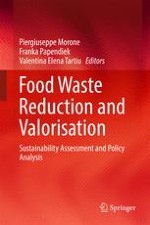2017 | OriginalPaper | Buchkapitel
10. Bringing a Sharing Economy Approach into the Food Sector: The Potential of Food Sharing for Reducing Food Waste
verfasst von : Pasquale Marcello Falcone, Enrica Imbert
Erschienen in: Food Waste Reduction and Valorisation
Aktivieren Sie unsere intelligente Suche, um passende Fachinhalte oder Patente zu finden.
Wählen Sie Textabschnitte aus um mit Künstlicher Intelligenz passenden Patente zu finden. powered by
Markieren Sie Textabschnitte, um KI-gestützt weitere passende Inhalte zu finden. powered by
